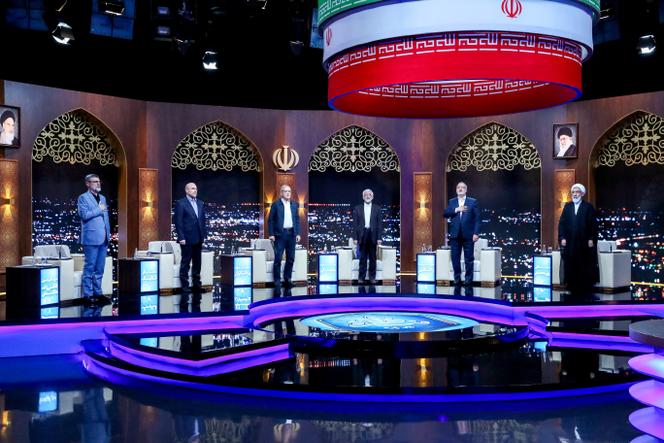

Iran: the issue of sanctions loomed over the first debate in the run-up to the presidential election

The first televised debate in Iran's presidential election, scheduled for June 28, was sluggish, slow and lacking in momentum. It mirrored the campaign, which kicked off in recent days, following the death of President Ebrahim Raisi in a helicopter accident on May 20.
For four hours on Monday, June 17, the six candidates, validated by the Council of Guardians of the Constitution – an unelected constitutional body – talked about the Iranian economy and its difficulties, as inflation reached 52% between March 2023 and March 2024, a figure not seen since 1943. None of the contenders really got to the heart of the matter. Diplomacy and in particular international sanctions, reimposed after the unilateral exit of the US from the agreement on the Tehran nuclear issue, as decided by the former US president, Republican Donald Trump, in 2018, loomed over this first debate. Four others are planned.
Hastily organized in the wake of Raisi's death, the elections are taking place against a backdrop of regional tension and Israel's war on Gaza. Of the six candidates in the running, five belong to the conservative camp. The sixth, Masoud Pezeshkian, represents the reformist camp, largely sidelined and marginalized by the regime in recent years. Among those disqualified is former parliamentary leader Ali Larijani, who has become a bête noire of the regime's hard-line wing for his more open approach to the West.
During the debate, Pezeshkian, minister of health during the second term of former reformist President Mohammad Khatami (1997-2005), described the sanctions as "disasters," hinting at his willingness, if he were president, to push through indirect negotiations with the Americans to reach a compromise on the Iranian nuclear issue. "Circumventing sanctions is possible, but some people get rich doing it," said this man who is surgeon by profession, in an allusion to certain people close to the regime, who pocket astronomical sums by continuing to trade with foreign countries.
On his end, Tehran's current mayor, the conservative Alireza Zakani, true to his camp's line, downplayed the effects of sanctions, emphasizing the country's domestic capabilities. "We need to neutralize sanctions internally and then move on to diplomacy," he said.
The former mayor of Tehran and current head of parliament, the conservative Mohammad Bagher Ghalibaf, took a more measured approach, acknowledging the deleterious impact of sanctions on the Iranian economy, while insisting on the benefits of alliances enabling Iran to position itself as a counterpoint to a Western-dominated international order. To attract foreign investment," he said, "we need to keep an eye on the potential offered by the BRICS group [Brazil, Russia, India, China and South Africa, to which Egypt, the United Arab Emirates and Ethiopia have been added since January] and the Shanghai Cooperation Organization [which brings together the main Asian powers]," two groups that Tehran has just joined. This "look to the east" is one of the policies favored by the Supreme Leader, Ali Khamenei, and the conservative camp. Since 2018, the moderate and reformist camp, which is in favor of opening up to the West, has been weakened.
You have 37.7% of this article left to read. The rest is for subscribers only.
